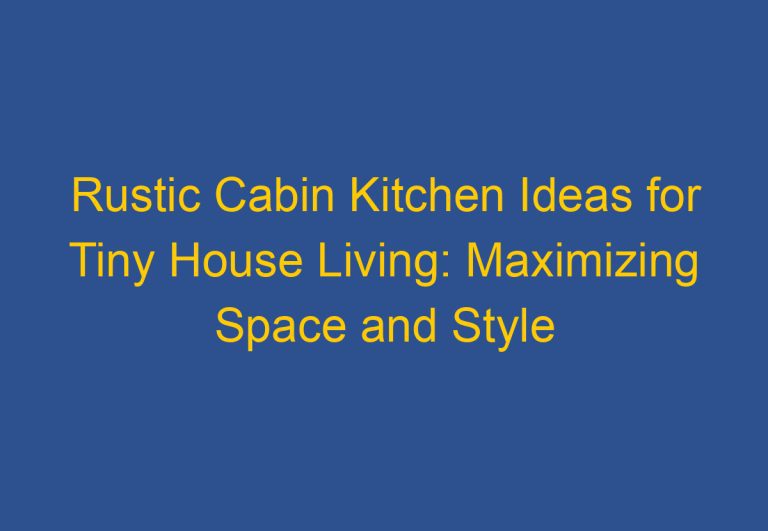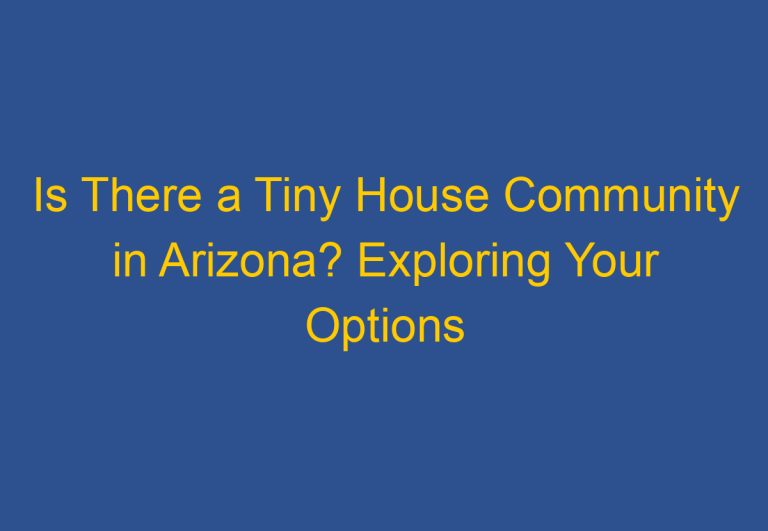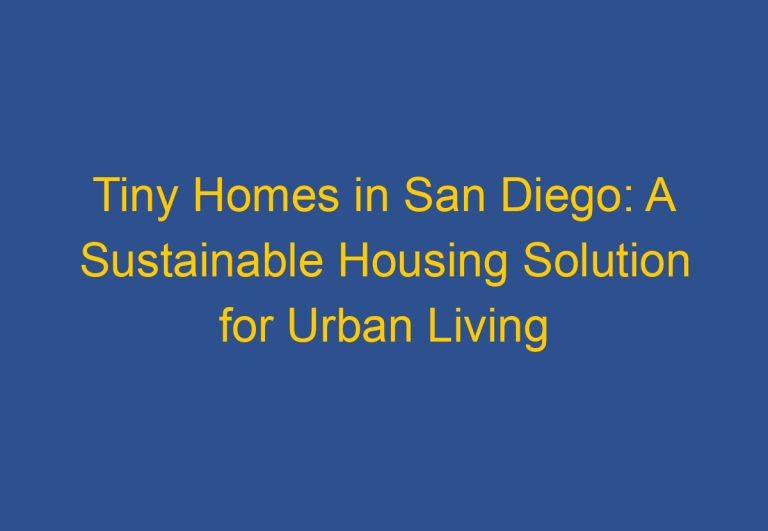Are Tiny Houses Legal in NJ? A Guide to Understanding the Regulations
Tiny houses have been gaining popularity across the United States in recent years, and New Jersey is no exception. However, potential tiny house owners in New Jersey may be wondering if these homes are legal in the state. The answer is yes, but with a few important caveats.

According to the 2018 International Residential Code, tiny homes are legal in New Jersey. However, in order to ensure compliance with the state’s regulations, it is important to follow the rules set forth in Appendix Q of the code. This appendix provides a framework for building and safety standards for tiny homes on a foundation, and it is important to adhere to these standards in order to ensure that a tiny home is considered a legal dwelling in New Jersey.
It is worth noting that tiny homes on wheels are considered recreational vehicles or mobile homes in New Jersey, and as such, must comply with the state’s RV laws in order to be considered a legal structure. This means that tiny homes on wheels must meet certain safety and building standards, and must be connected to utilities in order to be used as a dwelling place. Overall, while tiny homes are legal in New Jersey, it is important to follow the state’s regulations in order to ensure that a tiny home is considered a legal dwelling.
Legality and Zoning Regulations for Tiny Houses in New Jersey

Understanding New Jersey Zoning Laws
Zoning regulations in New Jersey play a crucial role in determining where tiny houses can be placed. Tiny houses are legal in New Jersey, but they must comply with the state’s zoning laws. Zoning laws vary from one municipality to another, and it’s essential to check with the local planning board to ensure compliance with the zoning regulations.
Building Codes and Compliance
Tiny houses in New Jersey must meet the building codes and compliance standards set by the International Residential Code (IRC). The IRC has a specific provision for tiny houses under Appendix Q, which provides guidelines for designing and constructing tiny homes. The habitable space on the hallways of tiny houses must have a minimum height of 6 ft 8 in. The ceiling height in bathrooms, toilet rooms, and kitchens can’t be less than 6 ft 4 inches.
Tiny House Movement and Municipal Response
The tiny house movement has gained popularity in recent years, and municipalities in New Jersey have responded by creating zoning regulations that allow for tiny houses. However, it’s important to note that not all municipalities have adopted zoning regulations for tiny houses. As such, it’s crucial to check with the local planning board to determine if tiny houses are allowed in a particular area.
In addition, obtaining a building permit is necessary before constructing a tiny house in New Jersey. The permitting process varies depending on the municipality, but it typically involves obtaining a zoning permit and a building permit. It’s essential to comply with the permitting process to avoid legal issues and ensure that the tiny house is built to code.
Overall, while tiny houses are legal in New Jersey, it’s crucial to comply with the state’s zoning regulations and building codes. It’s also essential to check with the local planning board to determine if tiny houses are allowed in a particular area and to comply with the permitting process.
Design and Lifestyle Considerations for Tiny Home Owners

Space Efficiency and Tiny Home Features
One of the most significant advantages of tiny homes is their space efficiency. Every inch of space is utilized to maximize the livable area. Tiny home owners must be strategic in their design choices to ensure that they make the most of their limited space. This includes choosing features that are multi-functional and can serve multiple purposes.
The kitchen, for example, should be designed to maximize counter space and storage while still being functional. Ceiling height must also be taken into consideration, especially in loft areas where headroom can be limited. Bathrooms must be compact and efficient, with a focus on functionality rather than luxury.
Utilities and Infrastructure for Tiny Homes
Tiny homes must be designed to be self-sufficient, with off-grid options for utilities and infrastructure. This includes solar panels for electricity, composting toilets, and water storage tanks. Tiny home owners must also be aware of the local regulations regarding the use of utilities and infrastructure, including the use of septic systems and city water.
The Social and Environmental Impact of Tiny Living
Tiny home living has a significant social and environmental impact. It promotes downsizing and a more minimalist lifestyle, which can reduce a person’s carbon footprint. Tiny homes also encourage a sense of community, with tiny house communities popping up all over the country.
However, tiny home owners must also be aware of the potential challenges that come with living in a tiny home, such as lack of privacy and limited living space. They must also be mindful of the impact their tiny home has on the environment and the surrounding community.
Overall, tiny home owners must carefully consider their lifestyle choices and design options to ensure that their tiny home is safe, efficient, and sustainable. By doing so, they can enjoy the benefits of tiny home living while minimizing any potential challenges.
Frequently Asked Questions

What are the zoning regulations for tiny houses in New Jersey?
Zoning regulations for tiny houses in New Jersey vary depending on the jurisdiction. In general, tiny houses are considered to be a type of accessory dwelling unit (ADU) and are subject to the same zoning regulations as ADUs. This means that they may be allowed in certain areas but not in others, and they may be subject to certain size and design requirements.
Can you legally live in a tiny house on your own land in NJ?
Yes, it is legal to live in a tiny house on your own land in New Jersey, as long as the house meets all of the necessary zoning and building code requirements. However, it is important to note that some municipalities may have additional regulations or restrictions in place, so it is important to research the specific regulations in your area before building or living in a tiny house.
What towns in New Jersey have approved tiny house living?
There are currently no towns in New Jersey that have specifically approved tiny house living. However, some towns may allow tiny houses as ADUs or as part of a larger development, as long as they meet all of the necessary zoning and building code requirements.
Are there any established tiny house communities in New Jersey?
Yes, there are several established tiny house communities in New Jersey, including Escape RV in Branchville and Tiny Estates in Elizabethtown. These communities offer a range of amenities and services, including communal spaces, laundry facilities, and on-site maintenance and management.
What are the building code requirements for a tiny house in NJ?
The building code requirements for a tiny house in New Jersey are the same as those for any other residential structure. This means that the house must meet all of the necessary safety and structural requirements, including those related to electrical, plumbing, and heating systems. In addition, the house must be built on a permanent foundation and must comply with all applicable zoning regulations.
How does New Jersey classify tiny houses in terms of housing laws?
New Jersey does not have a specific classification for tiny houses in terms of housing laws. Instead, tiny houses are generally considered to be a type of ADU and are subject to the same regulations as other ADUs. This means that they may be subject to certain size and design requirements, as well as zoning and building code regulations.






